#idaho
Text
#tictok#abortion#abortion bans#pro choice#us politics#fuck republicans#vote blue#idaho#texas#us supreme court#us vs Idaho#emtala#very important
26 notes
·
View notes
Text
Susan Rinkunas at Jezebel:
Today the Supreme Court held a brutal two hours of arguments in a case about whether women and pregnant people deserve life-saving medical care if that care happens to be abortion. (Yes, this is the second abortion case this term.) Several justices, and the lawyer for the plaintiff, trotted out wild hypotheticals and invoked the dangerous concept of fetal personhood in a disturbing preview of the future that awaits every state if Donald Trump wins the presidency. It could mean that people face horrible medical mistreatment simply because they’re pregnant and, at the most extreme end, could lead to a federal abortion ban.
The case, Moyle v. United States, is about whether state abortion bans like Idaho’s can override a longstanding federal law that requires emergency rooms to stabilize patients, including by offering abortion if necessary. That law, the Emergency Medical Treatment and Active Labor Act (EMTALA) says hospitals that accept Medicare funding have to stabilize patients in medical crises and deliver babies when women are in labor. But given that some states passed abortion bans that only have exceptions to prevent death, not to treat threats to health, the Biden administration reiterated hospitals’ obligations after the Dobbs decision, and later sued the state of Idaho.
Idaho strongly disagrees that its hospitals should have to provide abortions for threats to health—like when a woman’s water breaks in the second trimester, far too early for a baby to survive but, when left untreated, could result in a life-threatening infection called sepsis or extensive blood loss known as hemorrhaging. The state worked with the right-wing Christian legal firm Alliance Defending Freedom to craft its legal arguments and one such argument raised in briefs and in the courtroom is the claim that a fetus is a patient under federal law.
Justice Elena Kagan asked Josh Turner, the lawyer representing Idaho, how the state ban functions when doctors believe a woman’s pregnancy complication might cause her to lose her uterus, and thereby her ability to have children in the future, but not cause her to die. Turner’s response was chilling: “Congress under EMTALA recognizes that there are two patients to consider in those circumstances. And the two-patient scenario is tough when you have these competing interests.” This logic is terrifying, mostly because a fetus is only a patient under EMTALA when there aren’t health threats to the pregnant person. The woman is the patient first and foremost. Idaho is trying to claim that because the words “unborn child” are used in the law, it means that the interests of the woman and the fetus have equal weight, when they do not.
This is fetal personhood and it’s scary not least because the people being denied ER treatment in Idaho and other states are often in their first and second trimester and there’s no way the embryo or fetus will survive. The fetus is a lost cause at that stage, yet states like Idaho say that women themselves need to be facing death before they can have an abortion. (People coming to ERs later in pregnancy with complications would typically have labor induced and then doctors would try to keep the fetus alive.)
[...]
If by some miracle the court rules against Idaho, that doesn’t mean abortion access is safe by any means. Barrett and Gorsuch both asked if a future Congress could ban hospitals from performing any abortions or gender-affirming surgeries as a condition of accepting Medicare funds. Prelogar said yes, Congress does have the power to pass laws like that. And of course, there is the lurking threat of the 19th-century Comstock Act which a Republican president could enforce to ban abortion nationwide, even at clinics in states with abortion protections.
SCOTUS heard oral arguments on a pair of cases pertaining to EMTALA on Wednesday, and the radical right-wing black robed theocrat-majority are likely to rule in favor of Idaho's cruel anti-abortion law to weaken EMTALA.
See Also:
HuffPost: Conservative SCOTUS Almost Entirely Ignores Pregnant Patients In Emergency Abortion Arguments
Vox: The Supreme Court’s likely to make it more dangerous to be pregnant in a red state
#EMTALA#Abortion#Abortion Bans#Moyle v. United States#Idaho v. United States#Fetal Personhood#Idaho#Idaho SB1309#Alliance Defending Freedom#Elizabeth Prelogar#SCOTUS
16 notes
·
View notes
Text
By Jessica Corbett
Common Dreams
April 24, 2024
"At its core, this Supreme Court decision will reflect who we are becoming as a society."
Less than a month after a key abortion pill hearing, the right-wing U.S. Supreme Court on Wednesday heard arguments for another major reproductive rights case—one out of Idaho that could impact healthcare for pregnant women and people across the country.
Idaho is among the over 20 states that have tightened restrictions on abortion since the high court's right-wing majority reversed Roe v. Wade nearly two years ago with Dobbs v. Jackson Women's Health Organization. Since August 2022, abortions have been banned in the state except for reported cases of rape or incest or when "necessary to prevent the death" of the pregnant person.
"If the court does not uphold emergency abortion care protections, this ruling will have devastating consequences for pregnant people."
Before Idaho's near-total ban on abortion took effect, U.S. District Judge B. Lynn Winmill barred enforcement of it to the extent that it conflicts with the Emergency Medical Treatment and Labor Act (EMTALA), a 1986 federal law requiring emergency departments that accept Medicare to provide "necessary stabilizing treatment" to any patient with an emergency medical condition.
The Biden administration argues that such care includes abortion; Idaho's Republican policymakers—backed by the far-right Christian Alliance Defending Freedom—disagree. The U.S. Supreme Court in January paused Winmill's order and agreed to hear arguments in Moyle v. United States and Idaho v. United States.
As The New York Times reported Wednesday:
In a lively argument, questions by the justices suggested a divide along ideological lines, as well as a possible split by gender on the court. Justice Amy Coney Barrett, a conservative, appeared skeptical that Idaho's law, which bars doctors from providing abortions unless a woman's life is in danger or in specific nonviable pregnancies, superseded the federal law.
The argument also raised a broader question about whether some of the conservative justices, particularly Justice Samuel A. Alito Jr., may be prepared to embrace language of fetal personhood, that is, the notion that a fetus would have the same rights as a pregnant woman.
Also noting Barrett's apparent alignment with the three liberal women on the court, Law Dork's Chris Geidner predicted "it comes down to" Chief Justice John Roberts and fellow right-winger Brett Kavanaugh.
"Already, we see women miscarrying and giving birth to stillborn infants in restrooms and in their cars after hospitals have turned them away, and medical professionals put in impossible positions by extremist lawmakers," said MomsRising executive director and CEO Kristin Rowe-Finkbeiner, citing Associated Pressreporting from last week.
"Of all the horrors SCOTUS unleashed with its appalling, dangerous, massively unpopular ruling overturning Roe v. Wade, the threat that pregnant people—most of whom are moms—will be denied emergency medical care is among the worst," she asserted. "An adverse ruling in this case will mean emergency rooms can deny urgently needed care to people experiencing serious pregnancy complications that can destroy their health, end their fertility, and take their lives."
Alexa Kolbi-Molinas, deputy director of the ACLU Reproductive Freedom Project, similarly stressed that under a decision that favors the Idaho GOP, "pregnant people will suffer severe, life-altering health consequences, and even death."
"We're already seeing the devastating impact of this case play out in Idaho, where medical evacuations to transport patients to other states for the care they need have dramatically spiked since the Supreme Court allowed state politicians to block emergency abortion care," she noted.

The has also been an exodus of healthcare providers. Pointing out that those who violate Idaho's ban face five years in prison, The Guardian reported Wednesday that "between 2022, when Roe was overturned, and 2023, about 50 OB-GYNs moved out of the state."
As Republican lawmakers in various states have ramped up attacks on reproductive freedom since Dobbs, states that still allow abortions have seen an influx of "healthcare refugees." A Planned Parenthood spokesperson confirmed in January that about 30% of its abortion patients in Nevada—which borders Idaho—are from other states.
"With several of Nevada's bordering states enforcing abortion bans, pushing many people seeking care to our state, we've seen firsthand the devastation that anti-abortion policies are already wreaking," Reproductive Freedom for All director of Nevada campaigns Denise Lopez said Tuesday. "The Supreme Court must not allow us to spiral further into this healthcare crisis."
If the high court rules in favor of Idaho's Republican lawmakers, she warned, "all states will be impacted, even in places like Nevada with more than 4 in 5 voters supporting reproductive freedom."
Destiny Lopez, acting co-CEO of the Guttmacher Institute, declared that "at its core, this Supreme Court decision will reflect who we are becoming as a society: Are we okay with requiring pregnant individuals who face severe complications to suffer life-threatening health consequences rather than granting them access to abortion? Are we okay with forcing doctors to choose between violating federal law by not providing emergency abortion care or violating state law if they do?"
"If the court does not uphold emergency abortion care protections, this ruling will have devastating consequences for pregnant people—particularly Black and Brown folks, immigrants, people with lower incomes, those without health insurance, and LGBTQ+ communities—while further emboldening extremists," she emphasized.
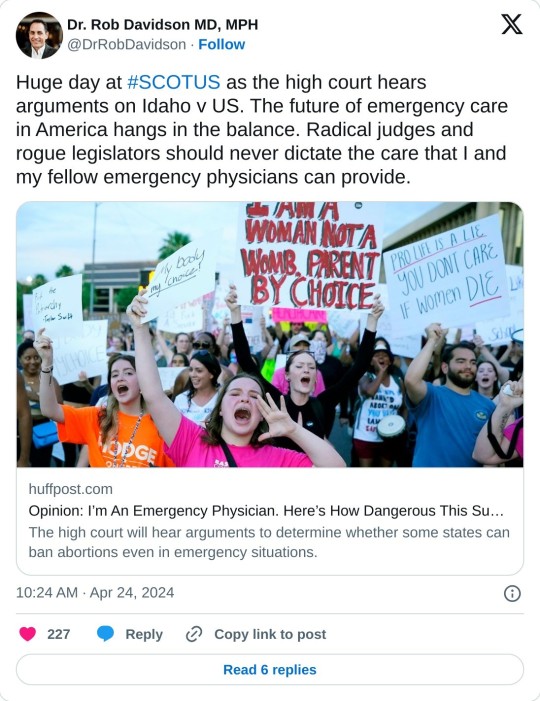
Arguments in the case have sparked multiple demonstrations, from a weekend rally in Boise, Idaho to a Wednesday gathering outside the U.S. Supreme Court in Washington, D.C., where Women's March organized a die-in to highlight the potential consequences of the forthcoming ruling.
"It's a horrifying time to be someone who needs critical abortion care in America right now," said Women's March executive director Rachel O'Leary Carmona. "The GOP is chipping away at women's bodily autonomy and livelihoods one illegitimate court case at a time—from fast-tracking a case on the authorization of a medication that's been safely administered for decades last month, to now bringing the fate of emergency abortion care to a Supreme Court captured by their radical, anti-choice agenda."
"We know what these cases really are: They're part of a series of efforts by Christian nationalist politicians to do anything they can to control women's bodies and cut back women's decisions about their healthcare, their family planning, and their lives," she added.
Similar warnings about far-right Christian nationalist attacks on a range of rights have dominated political contests this cycle—including the race for the White House. In November, Democratic President Joe Biden, who supports access to abortion care, is set to face former Republican President Donald Trump, who brags about appointing three of the six justices who reversed Roe.
The case has renewed arguments for considering changes to the country's top court, which over the past few years has not only seen plummeting levels of public trust but also been rocked by repeated ethics scandals.
"Idaho's abortion ban is a direct consequence of the court's radical decision to overturn Roe v. Wade and allow partisan state legislatures to determine Americans' access to abortion care," said Stand Up America managing director of policy and political affairs Brett Edkins. "If the Supreme Court once again sides with anti-abortion extremists, it will be further proof that this court is radically out of touch with the American people and must be reformed."
18 notes
·
View notes
Text
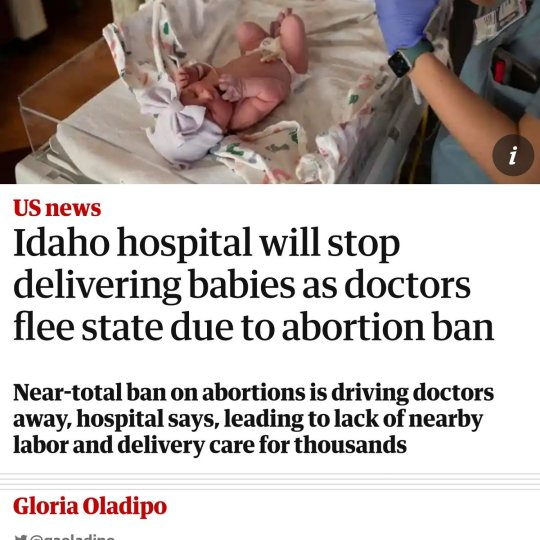
A rural pregnant woman in Idaho will now have to travel 46 miles in case of an emergency.
This is totally a normal thing and not at all batshit.
#News#politics#idaho#liberals#pregnancy#gop#democrats#republicans#scotus#health and wellness#healthcare
11K notes
·
View notes
Link
They have criminalized being trans in public.
4K notes
·
View notes
Text
312 notes
·
View notes
Text

Source
Morally bankrupt and evil
#politics#us politics#government#Supreme Court#Idaho#abortion#news#current events#women’s rights#pro choice#progressive#the left
393 notes
·
View notes
Text

477 notes
·
View notes
Text

Targhee National Forest, Idaho. Photo by Sean Musil.
#rvlife#camping#rv living#adventure#traveling#rvadventures#travel#campfire#rvliving#travel photography#vanlove#vanlife#vanliving#naturepicture#naturephotooftheday#naturephotography#idaho
665 notes
·
View notes
Text
Greedflation, but for prisoners

I'm touring my new, nationally bestselling novel The Bezzle! Catch me TOMORROW (Apr 21) in TORINO, then Marin County (Apr 27), Winnipeg (May 2), Calgary (May 3), Vancouver (May 4), and beyond!

Today in "Capitalists Hate Capitalism" news: The Appeal has published the first-ever survey of national prison commissary prices, revealing just how badly the prison profiteer system gouges American's all-time, world-record-beating prison population:
https://theappeal.org/locked-in-priced-out-how-much-prison-commissary-prices/
Like every aspect of the prison contracting system, prison commissaries – the stores where prisoners are able to buy food, sundries, toiletries and other items – are dominated by private equity funds that have bought out all the smaller players. Private equity deals always involve gigantic amounts of debt (typically, the first thing PE companies do after acquiring a company is to borrow heavily against it and then pay themselves a hefty dividend).
The need to service this debt drives PE companies to cut quality, squeeze suppliers, and raise prices. That's why PE loves to buy up the kinds of businesses you must spend your money at: dialysis clinics, long-term care facilities, funeral homes, and prison services.
Prisoners, after all, are a literal captive market. Unlike capitalist ventures, which involve the risk that a customer will take their business elsewhere, prison commissary providers have the most airtight of monopolies over prisoners' shopping.
Not that prisoners have a lot of money to spend. The 13th Amendment specifically allows for the enslavement of convicted criminals, and so even though many prisoners are subject to forced labor, they aren't necessarily paid for it:
https://pluralistic.net/2024/04/02/captive-customers/#guillotine-watch
Six states ban paying prisoners anything. North Carolina caps prisoners' pay at one dollar per day. Nationally, prisoners earn $0.52/hour, while producing $11b/year in goods and services:
https://www.dollarsandsense.org/archives/2024/0324bowman.html
So there's a double cruelty to prison commissary price-gouging. Prisoners earn far less than any other kind of worker, and they pay vastly inflated prices for the necessities of life. There's also a triple cruelty: prisoners' families – deprived of an incarcerated breadwinner's earnings – are called upon to make up the difference for jacked up commissary prices out of their own strained finances.
So what does prison profiteering look like, in dollars and sense? Here's the first-of-its-kind database tracking the costs of food, hygiene items and religious items in 46 states:
https://theappeal.org/commissary-database/
Prisoners rely heavily on commissaries for food. Prisons serve spoiled, inedible food, and often there isn't enough to go around – prisoners who rely on the food provided by their institutions literally starve. This is worst in prisons where private equity funds have taken over the cafeteria, which is inevitable accompanied by swingeing cuts to food quality and portions:
https://theappeal.org/prison-food-virginia-fluvanna-correctional-center/
So you have one private equity fund starving prisoners, and another that's gouging them on food. Or sometimes it's the same company. Keefe Group, owned by HIG Capital, provides commissaries to prisons whose cafeterias are managed by other HIG Capital portfolio companies like Trinity Services Group. HIG also owns the prison health-care company Wellpath – so if they give you food poisoning, they get paid twice.
Wellpath delivers "grossly inadequate healthcare":
https://theappeal.org/massachusetts-prisons-wellpath-dentures-teeth/
And Trinity serves "meager portions of inedible food":
https://theappeal.org/clayton-county-jail-sheriff-election/
When prison commissaries gouge on food, no part of the inventory is spared, even the cheapest items. In Florida, a packet of ramen costs $1.06, 300% more inside the prison than it does at the Target down the street:
https://www.documentcloud.org/documents/24444312-fl_doc_combined_commissary_lists#document/p6/a2444049
America's prisoners aren't just hungry, they're also hot. The climate emergency is sending temperatures in America's largely un-air-conditioned prisons soaring to dangerous levels. Commissaries capitalize on this, too: an 8" fan costs $40 in Delaware's Sussex Correctional Institution. In Georgia, that fan goes for $32 (but prisoners are not paid for their labor in Georgia pens). And in scorching Texas, the commissary raised the price of water by 50% last summer:
https://www.tpr.org/criminal-justice/2023-07-20/texas-charges-prisoners-50-more-for-water-for-as-heat-wave-continues
Toiletries are also sold at prices that would make an airport gift-shop blush. Need denture adhesive? That's $12.28 in an Idaho pen, triple the retail price. 15% of America's prisoners are over 55. The Keefe Group – sister company to the "grossly inadequate" healthcare company Wellpath – operates that commissary. In Oregon, the commissary charges a 200% markup on hearing-aid batteries. Vermont charges a 500% markup on reading glasses. Imagine spending decades in prison: toothless, blind, and deaf.
Then there's the religious items. Bibles and Christmas cards are surprisingly reasonable, but a Qaran will run you $26 in Vermont, where a Bible is a mere $4.55. Kufi caps – which cost $3 or less in the free world – go for $12 in Indiana prisons. A Virginia prisoner needs to work for 8 hours to earn enough to buy a commissary Ramadan card (you can buy a Christmas card after three hours' labor).
Prison price-gougers are finally facing a comeuppance. California's new BASIC Act caps prison commissary markups at 35% (California commissaries used to charge 63-200% markups):
https://theappeal.org/price-gouging-in-california-prisons-newsom-signature/
Last year, Nevada banned any markup on hygiene items:
https://www.leg.state.nv.us/App/NELIS/REL/82nd2023/Bill/10425/Overview
And prison tech monopolist Securus has been driven to the brink of bankruptcy, thanks to the activism of Worth Rises and its coalition partners:
https://pluralistic.net/2024/04/08/money-talks/
When someone tells you who they are, believe them the first time. Prisons show us how businesses would treat us if they could get away with it.

If you'd like an essay-formatted version of this post to read or share, here's a link to it on pluralistic.net, my surveillance-free, ad-free, tracker-free blog:
https://pluralistic.net/2024/04/20/captive-market/#locked-in
#pluralistic#carceral state#price gouging#greedflation#prisons#the bezzle#captive markets#capitalists hate capitalism#monopolies#the appeal#keefe group#hig capital#guillotine watch#wellpath#trinity services group#sussex correctional institute#cooked alive#air conditioning#climate change#idaho#oregon#freedom of religion#vermont#florida#kentucky#georgia#arkansas#wyoming#missouri#ramen
167 notes
·
View notes
Text
(5) Idaho's first 'abortion trafficking' arrest
Last week, an Idaho teenager and his mother were arrested for bringing the teen’s girlfriend out-of-state for an abortion. The pair were charged with multiple felonies, including second degree kidnapping, for taking a minor under 16 years-old “with the intent to keep or conceal [her] from her custodial parent...by transporting the child out of the state for the purpose of obtaining an abortion.”
The 15 year-old, identified in court records as K.B., was living in Pocatello with her 18 year-old boyfriend Kaydn* and his mother, Rachael, when she became pregnant. In May, they brought her to Oregon, where K.B. received abortion medication. Idaho’s ‘abortion trafficking’ law went into effect that same month.
The investigation into the mother and son began shortly after K.B.’s mother reported to police that her daughter had been sexually assaulted. Though K.B. became sexually active when Kaydn was 17 years-old, he turned 18 during the course of their relationship; so in addition to the kidnapping charge, court documents show that he’s also been charged with rape and sexual exploitation of a child.
During this conversation with law enforcement, K.B.’s mother also reported that her daughter had been taken to Oregon for an abortion without parental permission. This sparked a far-reaching investigation that included accessing geolocation data to place the teenager at a Planned Parenthood clinic in Bend, and tracking her movement with Kaydn and Rachael from Idaho to Oregon. (A search warrant, for example, shows that law enforcement accessed the phones of all three, and found that they were pinging cell towers in the area of the clinic.)
318 notes
·
View notes
Text




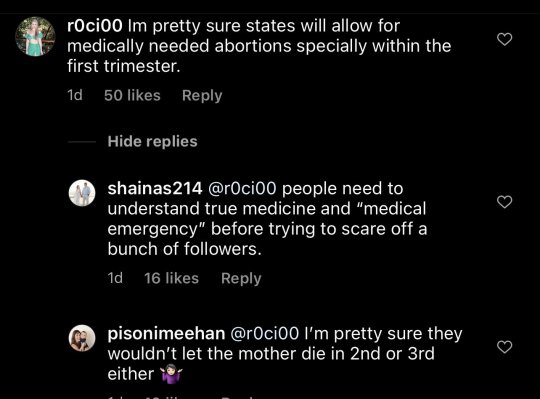

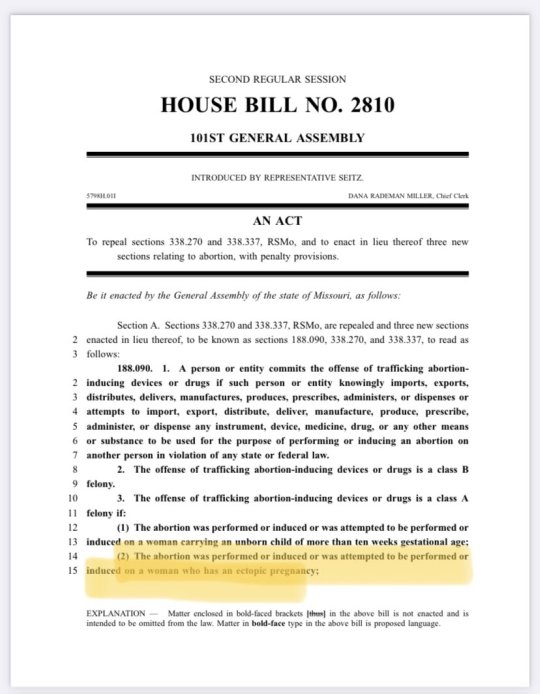
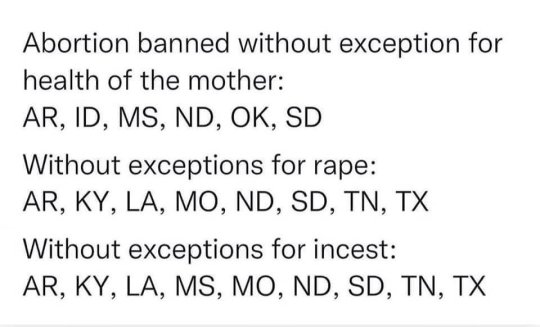
#Roe vs wade#scotus#news#missouri#texas#democrats#republicans#politics#donald trump#Ohio#arkansas#science#South dakota#idaho#maga#north dakota#gop
12K notes
·
View notes
Text


Idaho Sunset Jasper/Agate, Lemhi County, Idaho, photos by Casey Santee
184 notes
·
View notes
Text
Two Idaho lawmakers have introduced a bill to charge those who administer mRNA vaccines with a misdemeanor.
Sen. Tammy Nichols, R-Middleton, and Rep. Judy Boyle, R-Midvale, sponsored HB 154. It was introduced in the House Health & Welfare Committee on Feb. 15 by Nichols. According to the bill text, "A person may not provide or administer a vaccine developed using messenger ribonucleic acid technology for use in an individual or any other mammal in this state."
That person would then be charged with a misdemeanor.
Nichols said during her presentation to the committee, "We have issues this was fast tracked."
Nichols said there is no liability, informed consent or data on mRNA vaccines. She later clarified she was referring to the two COVID-19 vaccines, Pfizer and Moderna.
"I think there is a lot of information that comes out with concerns to blood clots and heart issues," Nichols said.
Rep. Ilana Rubel, D-Boise, questioned Nichols' statement that the vaccines were fast-tracked. She said her understanding was that the vaccines were approved and survived the testing, later approved by the FDA.
Nichols said she is finding it "may not have been done like we thought it should've been done."
"There are other shots we could utilize that don't have mRNA in it," Nichols said.
MRNA is a molecule that assists in making proteins. The COVID-19 vaccines, which are known as mRNA vaccines, help your body make proteins that mimic the COVID virus to help bodies fight off the infection, according to John Hopkins Medicine. MRNA was discovered in the early 1960's, John Hopkins states. Some were used to fight the Ebola virus. Researchers are also currently working to use mRNA to prevent other respiratory viruses.
The bill requires a future vote in the committee to pass onto the House floor for debate.
#us politics#news#ktvb#2023#vaccines#vaccine bans#misdemeanor#idaho#HB 154#idaho legislature#Idaho House Health & Welfare Committee#Tammy Nichols#Judy Boyle#mrna vaccines#Ilana Rubel#covid vaccine#coronavirus vaccine#moderna#Pfizer#food and drug administration#trust the science#conservatives#republicans#gop#gop platform#gop policy
2K notes
·
View notes

